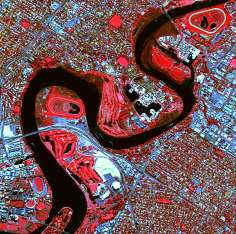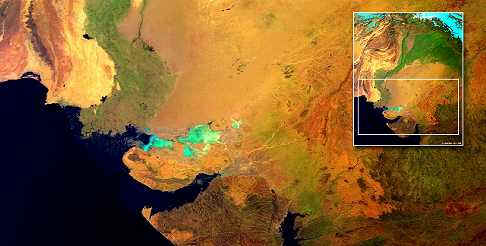|
Home
|
|
--------------------------------- |
|
Vegetation |
|
--------------------------------- |
|
Sensors |
|
--------------------------------- |
|
Images |
|
--------------------------------- |
|
Research Links |
|
--------------------------------- |
|
Works Cited |
|
--------------------------------- |
| |
|
|
| |
|
|
|
|
| |
| |
|
|
|
|
|
|
|
|
|
|
|
|
|
|
|
|
|
|
|
|
|
|
|
|
|
|
|
|
|
| Remote sensing is becoming more prevalent in
large-scale agriculture and thus here is a brief description
of the sensors used in SPOT that help to further
agricultural crop yield. There has been five SPOT
satellites put into outer space and out of those five four
of them are still occupational. This section is going
to focus on the sensors that are part of SPOT 5 in order to
describe the most recent sensors launched into space. |
| |
| |
|
Key Components: |
- Instrumentation dedicated to along track stereo
acquisition (allows DEM's to be derived)
- higher ground resolution: 5 meters and 2.5 in
panchromatic mode
- higher resolution in multispectral mode: 10 meters
in all three sprectral bands in the visible and near
infrared ranges
- field width of each instrument: 60 km
|
|
Sensors: |
| |
|
HRG Sensors- |
There are two high resolution geometric instruments aboard
and they generate data at four resolution levels with the
same 60km swath:
- images in the SWIR band: 20m
- multispectral images: 10m
- pan images: 5m
- supermode pan images: 2.5m
The first band ranges from .50 -.59, second band is .61-
.68 and the third band is .79 - .89, while SWIR is 1.58 -
1.75 (Sensors).

Above is an image gathered by using the
HRG Sensor. |
| |
|
HRS Sensors- |
|
This instrument is capable to acquire stereopair images,
which can be used to derive DEM's. The characteristics of
this sensor are as follows the spectral band is
panchromatic, there is a 10m resolution. Also the
imaging swatch is centered on the track at 120km, while the
maximum scene length is 600km (Sensors). |
| |
|
VEGETATION Sensor- |
|
This instrument is so useful because of its almost daily
coverage and a resolution of 1km allows it to be used to
monitor global change. This instrument includes a
wide-angle radiometric camera operating in four spectral
bands (blue, red, near-infrared, and middle-infrared) at a
resolution of 1km. The first band ranges from .43 -
.47, the second band is .61 - .68, the third band is .79 to
.89, while the MIR is 1.58 to 1.75.

Above is an image gathered by using the
Vegetation Sensor.
|
| |
|
|